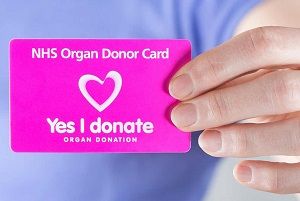What are the Changes to Organ Donation?
From May the 20th 2020, England will have an ‘opt out’ system for organ donation (also referred to as Max and Keira’s Law).
The new law considers all adults in England to have agreed to be an organ donor when they die, unless they (either):
- Already recorded a decision not to donate organs and tissues.
- Qualify as a person in one of the excluded groups (see below).
Medical personnel will still respect your beliefs, faith, and culture even if you register for organ donation on the NHS website.
Furthermore, the authorities always approach the family members of a deceased person in the normal way. So, you have an opportunity to choose whether you want to be an organ donor or not when you die.
A specialist nurse will check with your family that any decision you recorded on the NHS Organ Donor Register remains the latest known decision.
Why the Law on Organ Donation is Changing
Every day, someone will die waiting for a transplant of some sorts across the United Kingdom. The law changes on donating organs aims to help improve – or save – the lives of more people.
Note: Another section contains more information about UK blood donation rules, including donating blood if you have a tattoo and the weight requirements.
How to Register for Organ Donation
The National Health Service (NHS) claim the selfless actions of one organ donor can either save or transform the lives of up to nine (9) other people.
Moreover, tissue transplants can make a significant improvement to another person’s quality of life. For example:
- A cornea transplant can help someone to see again.
- A replacement heart valve can be used to treat a heart defect.
- Skin transplants help to treat patients with severe burns.
Countless donors have already registered to help others. You can register to become a potential organ donor too by following these two simple steps:
- Record your organ donation decision on a secure database using the NHS Organ Donor Register.
- Tell your family and close friends what you decided. Doing so will help them support your decision during an emotional and difficult time.
Note: You can speak to somebody about the choices available by calling the dedicated ‘opt out enquiries’ phone number [Telephone:0300 303 2094].
Organ Donor Excluded Groups
The law changes around organ donation in England affect all adults – unless they already recorded a decision not to donate or they fall into an exclusion group.
The excluded groups are:
- Individuals under the age of eighteen (18).
- People lacking enough mental capacity to understand the new arrangements (e.g. carry out the required action).
- People who have lived in England for a period of less than twelve (12) months prior to their death.
- Visitors to England (including anyone who does not live here on a voluntary basis).

You can also choose to amend your existing registration by updating your personal information or donation preferences on the NHS website.
Note: People under the age of 18 can still decide whether to become a donor in the future by recording their decision and telling their family.
NHS Organ Donation Register (BSL)
The short video presentation by the NHS [1:37 seconds] explains more about the new organ donor law in England. The animation includes British Sign Language (BSL).
Important: Organ donation is a precious gift of generosity that saves lives. Nevertheless, the laws in the United Kingdom on transplants prohibit the sale of human organs or tissue (i.e. they cannot be bought or sold).

